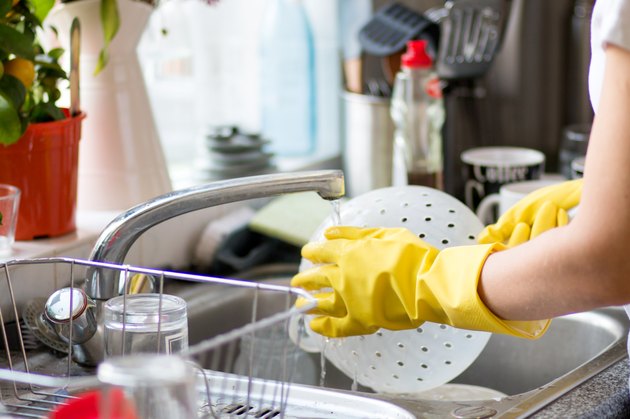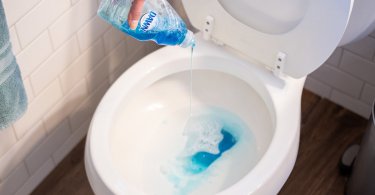Contact dermatitis is characterized by inflammation of the skin due to external skin contact with an irritating substance such as dish soap. Contact dermatitis is divided into two types: irritant contact dermatitis and allergic contact dermatitis. If you experience mouth swelling, in addition to other allergy symptoms, when exposed to dish soap, you are likely experiencing allergic contact dermatitis.

Advertisements
Physiology
Allergic contact dermatitis, which occurs in two phases, develops as a result of a hypersensitivity reaction elicited through your immune system. The first phase of allergic contact dermatitis is called the sensitization phase. During this phase, the allergen in dish soap penetrates the skin and attaches to specific immune cells, called Langerhan’s cells, which carry the allergen to the lymph nodes. At this point, another type of immune cell, called T-lymphocytes, produce cells that develop a memory for the allergen. The sensitization phase occurs only once and generally does not produce any physical symptoms.
The next phase is called the elicitation phase. Next time you are exposed to the chemical in the dish soap, T-lymphocytes begin to multiply and the inflammatory process begins. The inflammatory process pulls T-lymphocytes to the skin surface. The elicitation phase is when a visible allergic reaction occurs.
Advertisements
Normal Symptoms
The presence of the T-lymphocytes at the skin surface results in itching, redness, swelling and the development of small blisters. As the allergic reaction progresses, you may develop hives and the skin can become thick and scaly.
Mouth Swelling
Severe allergic contact dermatitis can cause swelling of the mouth and throat, a condition called angioedema. During the inflammation process, your body releases chemicals called histamines, which causes your blood vessels to swell. If the blood vessels swell too much, it can interfere with breathing, possibly leading to death. If you experience swelling in the mouth after exposure to dish soap, seek emergency medical attention.
Considerations
Allergic contact dermatitis is usually related to one specific chemical or a group of chemicals with similar characteristics. With dish soap, it is often added fragrances that trigger an allergic response.
To reduce the risk of allergic contact dermatitis when using dish soap, choose fragrance-free soaps. Soaps listed as hypoallergenic and unscented may still contain small amounts of fragrance. It is also helpful to wear rubber gloves when using dish soap.
REFERENCES & RESOURCES NetDoctor: Contact Dermatitis Asthma and Allergy Foundation of America: Contact Dermatitis The Merck Manual Home Health Handbook: Dermatitis PubMed Health: Angioedema University of Maryland Medical Center: Angioedema American Osteopathic College of Dermatology: Allergic Contact Dermatitis


Comments